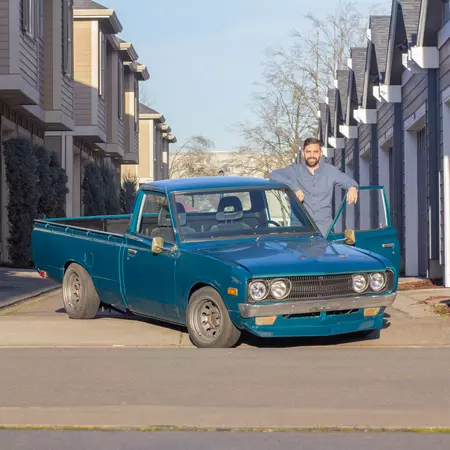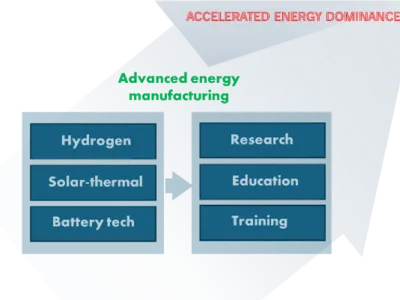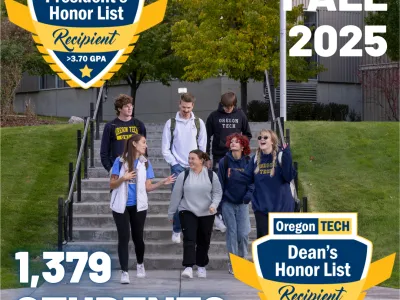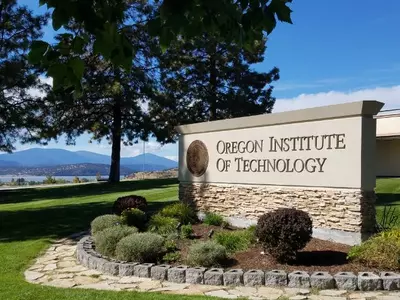
A senior in Renewable Energy Engineering at Oregon Institute of Technology’s Portland-Metro campus in Wilsonville, Scott Morris is interested in things that will stand the test of time. For his senior capstone project, he wanted to take his love of the old-time survivor, a 1979 Datsun 620 pickup, and combine it with his passion for renewables by converting the pickup into an electric vehicle (EV).
The capstone project is an Oregon Tech student’s final showcase of the accumulative knowledge gained. While many students participate in an externship or internship, engineering students also spend their last three terms demonstrating the grasp of their field of study with their capstone project.
Scott’s goal is to highlight renewables for automotive applications—even a pickup that’s 43 years old. While the EV conversion concept has been done before, a Datsun-specific transformation required some planning from scratch for Scott, which he hopes will provide a guide for others in the future.
“My goal is to outline this task as simple as possible for other conversions,” says Scott. “This means that an owner of a Datsun 620 pickup could remove the old internal combustion engine and related driveline and bolt in the EV conversion with little to no modification of the frame or body. By doing this, converting a vehicle to electric can be done quickly and would prolong the use of a classic car.” Scott’s outline of the process will help future Datsun lovers preserve the design of classic vehicles and bring renewed life back to the vehicle.
“My project will utilize 3D scanning technology and computer-aided design (CAD) software to develop a methodology where designing and production of the EV conversion kit can be applied to other classic vehicles in the future,” says Scott. “As most classic vehicles were designed in an era before computer design existed, a 3D scanner can provide a digital model to design the conversion around. By using CAD as the primary designing environment, one can produce several versions of the kit without cutting a single piece of material.” The work Scott’s completing will also increase the safety and performance of the vehicle.
“The automotive industry struggles to reduce global emissions as one of the top contributors of greenhouse gas in the world,” he shared. “Trucks are the most sold vehicle in the United States, but their ever-increasing size makes it difficult for them to be efficient as the extra weight and profile area reduces the capabilities of an electric drive system. By selecting a classic compact truck, I hope to get the best of both worlds—the efficiency of a smaller vehicle and the cargo carrying capabilities of a truck.”
When Scott enrolled at Oregon Tech in 2018, he had already received an associate degree in Automotive Collision Repair from Metropolitan Community College in Omaha, Nebraska. Combining his experience in the automotive industry with his interest in renewable energy, Scott hopes to establish himself in the automotive industry designing EVs to help reduce global emissions. He aspires to work for companies that push the envelope in design and innovation, looking for new ways to advance the world of transportation. While he has his eyes on the prize of his dream job, he isn’t afraid to stay flexible in order to reach his goals. Whether it is working for large automotive manufacturers such as Ford, Toyota, Volkswagen, or Tesla; an electric grid company such as PGE; or a startup company making electric motorcycles, he aims to stay true to his values of making cleaner, more fun, affordable, electric transportation.
Scott also received an associate degree in Aviation Operations from the Community College of the Air Force, is an active member of the United States Air Force Reserves and is a Peer Advisor at Oregon Tech’s Veteran Resource Center.
To complete his project, he has been working with his advisor Dr. Aaron Scher, a professor in the Electrical Engineering and Renewable Energy department, and Oregon Tech’s instrument technologist, Richard Ellis, to acquire access to 3D scanning equipment. He has been collaborating with the school’s clubs and organizations to get more people on board with acquiring the technology he needs to complete his project. Scott has also connected with local conversion shops in Oregon, such as SHIFT Electric Vehicles in Albany, and plans to approach a local manufacturer of EV components in Wilsonville- Cascadia Motion. He hopes the 3D scanning technology will also help other student projects in various engineering fields as well as expanding the biomedical field of prosthetics engineering.
###








